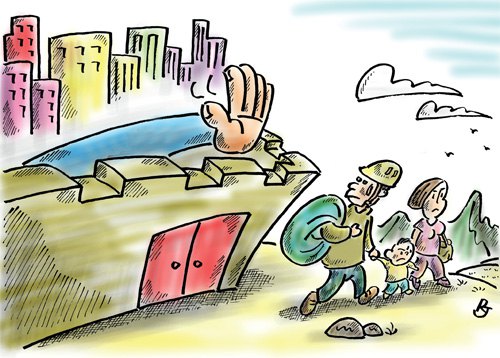|
 |
|
(CFP) |
China's urban population accounted for 52.57 percent of the country's total by the end of 2012 according to the official figure. A large proportion of new urban residents are migrant workers who left the countryside to find jobs in cities. However, under the rigid household registration system, the large legion of migrants doesn't have equal access to public services in cities.
Ahead of the Third Plenary Session of the 18th Central Committee of the Communist Party of China on November 9 to 12, people once again called for reforms to the household registration system, or hukou system, via various media outlets. The following are excerpts of the discussion:
Li Qiang (China Youth Daily): While absorbing migrant populations into the urban industrial system, cities should help them find their way toward an urban lifestyle. The household registration system, which completely ignores the place a person currently resides, lags behind demands of time and has an adverse impact on urban administration.
Many surveys show that the majority of migrant workers no longer work on farmland or live in the countryside, while many even grew up in cities. However, under the household registration system, they are still registered as rural residents. A lot of people are no longer permanent residents of places where their hukou are registered, which means that hukou-based administration fails the realities of rapid Chinese urbanization.
Urban life often features advantages such as more job opportunities as well as better medical and educational resources. It is understandable that many rural people, especially the young, are moving to cities from the countryside. Although migrant workers have met with a lot of difficulty in being absorbed by local communities, their eagerness to share the resources cities offer has not dampened.
According to a survey conducted by Tsinghua University, more than 21 percent of migrant workers who are registered as rural residents have purchased properties in cities. A priority of future reform should be in allowing trans-regional mobility of social security accounts.
People who live in cities other than the place of their household registration can be divided into two categories: those from a rural family and those from a smaller city. Comparatively speaking, people from the second category have even more urgent demands over household registration system reforms, especially college graduates, as the lack of a hukou in cities can affect their social security benefits. Therefore, reform should meet the demands of different categories of people.
Reform designers should also map out different policies for cities of different sizes. Since the beginning of 1995, trial reforms have been carried out across China. Now, the Ministry of Public Security allows all local governments to conduct new trials, a big step in progress. Reform of the hukou system should be conducted step by step.
Wang Yukai (www.youth.cn): Without reforming hukou system, other related reforms such as letting migrant workers enjoy equal access to public services and the transfer of land-use rights in rural areas won't make headway. This increases the urgency of hukou system reform. One problem that needs to be solved pertains to the possible overpopulation of megacities such as Beijing and Shanghai once migrant populations are allowed to register their hukou there. Therefore, cities of different sizes should adopt different household registration policies. Moreover, reform is not only focused on allowing more people to register their hukou in cities. The latter must provide new residents with necessary resources, while also creating job opportunities.
| 